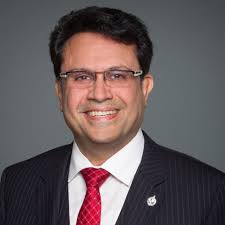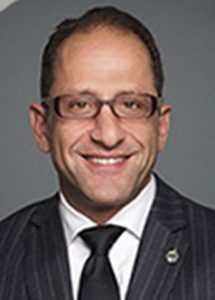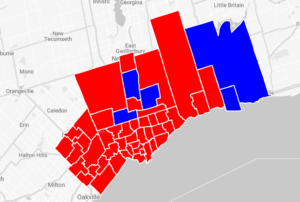November 01, 2019
by Warren L. Nelson

Both of the Iranians who are members of Canada’s House of Commons have won re-election in the federal elections—but one just barely made it back after he was attacked by some members of the Iranian expat community.
The two men both serve in the area of northern Toronto where Iranian immigrants are concentrated. But neither riding (the Canadian term for a constituency) has anywhere near a majority of Iranians, so neither man could win based simply on ethnic solidarity.
Both ridings span Yonge Street, Toronto’s main street, where it extends far north into the suburbs. Their districts don’t adjoin. But only one other riding comes between them.
Both men are members of the Liberal Party, which was the majority party going into the elections October 21. The Liberals lost their majority in the balloting, but remain the largest party and are expected to form a coalition government with the more leftist New Democratic Party (NDP), with Prime Minister Justin Trudeau remaining in office.

The two men are the only Iranian-Canadians ever to win election to the federal House of Commons. Both were elected in the federal elections four years ago.
Ali Ehsassi, 49, kept his seat in the riding of Willowdale, just north of downtown Toronto. He won 49.1 percent of the vote this year, down from 53.4 percent in 2015. His main opponent, from the Conservative Party, won 36.2 percent of the ballots, down from 37.0 percent the last time. The other five candidates this time drew 14.7 percent, while four years ago the other three candidates drew 9.7 percent.
Before his election, Ehsassi was a lawyer in private practice. He has also been a civil servant in both Ontario province and the federal government. He was born in Geneva, the son of a diplomat under the Shah, but his family soon moved back to Tehran and then later located to New York City where his father was assigned to the UN. After the revolution, they moved to Canada when Ehsassi was a teenager.
Ehsassi said the main issues in his campaign were gun violence, affordable housing and the environment.

His riding is densely immigrant. The last census showed the languages spoke at home were 36 percent English, 19 percent Chinese, 10 percent Persian, 9 percent Korean, 6 percent Russian, 3 percent Tagalog (the main language of the Philippines), 2 percent Italian, 2 percent Spanish, 1 percent French and 1 percent Arabic.
In both elections that Ehsassi won, his main opponents were Chinese Conservatives. In 2015 the man he beat was the incumbent.
In Parliament, Ehsassi has been very active on human rights issues internationally, and has issued frequent statements critical of the conduct of the Islamic Republic.
The other winner—if only barely—is Majid Jowhari, 58, in the Richmond Hill riding just a mile north of Ehsassi’s riding. Jowhari faced the same Conservative opponent he ousted in the elections four years ago. This time Jowhari won by just 112 votes. His percentage fell from 46.9 percent in 2015 to 43.4 percent in 2015.
As with Ehsassi’s riding, the Conservative candidate also lost votes, as the ballots against the major party candidates in both ridings drifted to third party candidates. Costas Menegakis, the Conservative candidate both times, saw his vote fall marginally from 43.3 to 43.2 percent.
Jowhari was born in the Yusefabad area of Tehran and moved to Canada to attend Ryerson University, becoming an industrial engineer before forming his own consultancy.
Jowhari won despite a last minute email from four prominent Liberals saying they “could not” vote for Jowhari. The signers included fellow Iranian-Canadian Liberal Reza Moridi, who was the Richmond Hill legislator in the Ontario provincial legislative assembly until his defeat last year.
A local news website said, “The email gave no explanation for the statement, but several of those who signed the email later expanded on their reasons, via social media and in interviews with yorkregion.com, pointing to Jowhari’s record as a Member of Parliament for the past four years and media reports of his activities.”
Moridi said that he was voting for Costas Menegakis, the Conservative candidate.
Speculating on the terse email, several Richmond Hill residents and Iranian expats on social media drew links to Jowhari’s lobbying for friendlier relations with the Iranian regime and to his statement in campaign literature that he was a professional engineer. He was a licensed professional engineer in the 1990s but did not renew his license in 1999 and was told he could not use that title in his campaign literature.
Yorkregion.com said, “For voters not privy to the controversy, the email blast was simply confusing and appeared to be an unfair drive-by smear. Others viewed it as a betrayal of the [Liberal] party and further fracturing of the Iranian diaspora.”
Meanwhile, about 20 residents and members of the expat Iranian community staged protests just before the election outside Jowhari’s Yonge Street campaign office.
“As residents of Richmond Hill, we refuse to be represented by someone who has been ignoring human rights in Iran and working for the interests of a terrorist regime,” said resident Setareh Saboor.
The question of Jowhari’s stand on Iran is not new. On December 30, 2017, as protests in Iran erupted, Jowhari put out two tweets containing Foreign Affairs Minister Chrystia Freeland’s official statement supporting the right of Iranians to protest.
Jowhari added his own thoughts. “As our [Canadian] government is closely monitoring the ongoing protests in Iran; it is my sincere hope that the brave nation of #Iran have the opportunity to air their legitimate financial, social and political concerns with the support of their elected government, in a secure environment and without the fear of persecution.”
That seemingly innocuous statement raised a number of flags for many Iranian-Canadians, starting with Jowhari’s use of the word “elected.” Many also were bothered by Jowhari’s description of Iranians protesting “with the support” of their government.
Jowhari responded: “Having had the opportunity to hear from a broad range of perspectives over the past few days, it’s clear to me that the word ‘elected’ has overshadowed my intent: that I implore all levels of the Iranian authorities to exercise utmost restraint and fully respect the rights of the Iranian people to freely assemble and to express themselves without fear of persecution or retaliation.”
The position of Canada’s Foreign Affairs Ministry, which Jowhari was supporting, was similar to that taken in 2009 by the Obama Administration during the post-election protests in Iran—to support the right to peaceful protest, to criticize the regime for attacking peaceful protesters and to avoid endorsing the opposition, which told foreign supporters that expressions of support would hurt them by allowing the regime to tab the opposition as a tool of foreigners.
